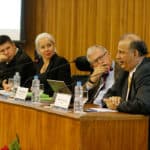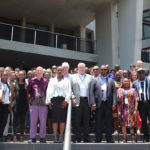Regional highlights
 The Systems Analysis and the AMERICAS regional conference in Rio de Janeiro looked at challenges shared by countries in the region and how systems analysis can address them.
The Systems Analysis and the AMERICAS regional conference in Rio de Janeiro looked at challenges shared by countries in the region and how systems analysis can address them.
Researchers investigated the determinants of different types of capital flows to MEXICO and the impact of shocks on each component of the financial account for the Mexican Balance of Payments.
The first US Aging Data Sheet presented traditional and new measures of aging for all US states.
A study showed that female yellow perch in Lake Erie, US, may be rapidly evolving delayed maturation since harvest was relaxed in the late 1990s. The results provide a rare example of evolutionary bounce-back.
 A course on policy planning in aging societies and population projections was held in Bangkok, with participants from CHINA, INDONESIA, and THAILAND.
A course on policy planning in aging societies and population projections was held in Bangkok, with participants from CHINA, INDONESIA, and THAILAND.
Engagement with multiple stakeholders in CHINA, JAPAN, and MALAYSIA resulted in the development of a regional water resources assessment model to build capacity and a research- and policy framework.
 The results from a collaboration with researchers in CHINA showed that a global power grid could help unlock remote renewable energy resources and reduce greenhouse gas emissions.
The results from a collaboration with researchers in CHINA showed that a global power grid could help unlock remote renewable energy resources and reduce greenhouse gas emissions.
 Input was provided to the Indian Government on the design of a program that provides liquid petroleum gas access for clean cooking in rural INDIA.
Input was provided to the Indian Government on the design of a program that provides liquid petroleum gas access for clean cooking in rural INDIA.
Researchers contributed to the land use sector assessment in the Low Carbon Development INDONESIA (LCDI) Report, launched by the Ministry of National Development Planning.
Collaborating with the KOREA Environment Institute, researchers used participatory research methods to operationalize climate risk management with a focus on disaster risk management and climate adaptation.
The BeWhere MALAYSIA model, developed with the Universiti Teknologi Malaysia, was used for bioenergy policy assessment for the country.
 Researchers investigated cooperation opportunities in GREATER EURASIA, including the impact of digitalization, the potential to enhance the economic ties, and fostering dialogue among stakeholders.
Researchers investigated cooperation opportunities in GREATER EURASIA, including the impact of digitalization, the potential to enhance the economic ties, and fostering dialogue among stakeholders.
The risk of large-scale arboviral outbreaks in EUROPE resulting from the spread of a specific mosquito species due to climate change was highlighted in a study.
 A citizen science mobile app was launched to gain insights into the use of urban green spaces in AUSTRIA.
A citizen science mobile app was launched to gain insights into the use of urban green spaces in AUSTRIA.
 An ISRAEL version of the Greenhouse Gases – Air Pollution Interactions and Synergies (GAINS) model is being implemented in collaboration with the Israeli Ministry of Environment, to support the development of cost-effective pollution control policies.
An ISRAEL version of the Greenhouse Gases – Air Pollution Interactions and Synergies (GAINS) model is being implemented in collaboration with the Israeli Ministry of Environment, to support the development of cost-effective pollution control policies.
Studies for the SWEDISH Environmental Protection Agency investigated the trade-offs between forestry and moose populations, and the risks and mitigation options for chronic wasting disease, which poses a threat to the country’s wildlife.
 A regional conference co-hosted with South African partners focused on the transformative uses of systems analysis to address regional challenges in AFRICA.
A regional conference co-hosted with South African partners focused on the transformative uses of systems analysis to address regional challenges in AFRICA.
